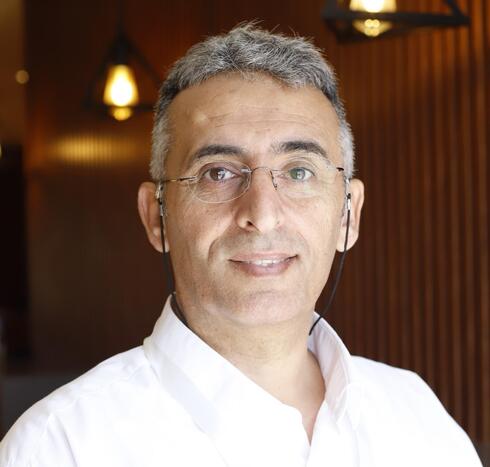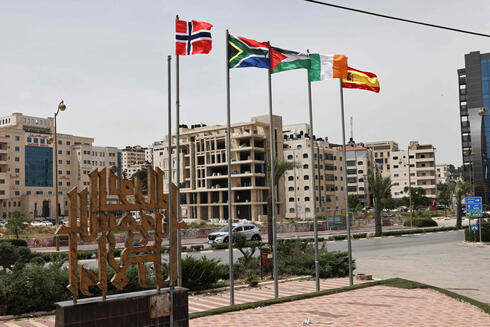
"I want to build more bridges between Palestinians and Israelis": Creating a Palestinian tech hub in East Jerusalem
The ongoing multi-front war has placed great strain on East Jerusalem’s nascent tech sector as well as ties between the Israeli and Palestinian tech industries. With the Palestinian economy facing potential collapse, the stakes for the industry have never been higher.
Despite being only a short distance from Tel Aviv, one of the world’s top tech hubs, East Jerusalem faces significant barriers to building its own tech ecosystem. Palestinians in East Jerusalem encounter unique obstacles, opportunities are scarce and access to Israeli tech jobs is mostly limited to those who attend Israeli institutions. Most highly educated Palestinians are funneled into the small and highly competitive Ramallah tech scene. In any case, the Palestinian talent that exists often doesn't remain in Jerusalem.
Mahmoud Khweis, CEO of Jinnovate and founder of Techlinic, is determined to change this landscape. “Why should someone from Jerusalem have to travel to Tel Aviv or Ramallah for work?” he asks. Driven by this question, Khweis founded Techlinic as the first Palestinian-owned tech company based in East Jerusalem, aiming to provide local employment opportunities and inspire future entrepreneurs.
“The goal was to create jobs. I thought that if I succeeded, it would encourage more people to start their own companies,” he says. Techlinic quickly found success, securing a partnership with Israeli IT services company Ness Technologies to run bootcamps which have trained over 120 people from East Jerusalem in software development, automation testing, and outsourcing.
Building on this momentum, Khweis launched Jinnovate, a healthtech accelerator focused on transforming healthcare in East Jerusalem. “East Jerusalem hospitals are chronically underfunded and face internal management challenges,” Khweis explains. Partnering with Sheba Medical Center, Shaare Zedek, and the Takwin Fund, he launched the Jerusalem Innovation Health-Tech Center (Jinnovate) in 2024 which already supports 16 startups, six of which are operational.
The project has drawn support from the Jerusalem Municipality which has provided both office space and strategic connections, including the creation of a co-working space in East Jerusalem’s Wadi Joz neighborhood called EasTech as part of the larger $2.1 billion Silicon Wadi urban renewal project in the area. "The support we’ve received from the municipality has been overwhelming," Khweis said. “I was involved in writing the five-year strategy for East Jerusalem on tech and employment. One of the goals for the municipality is to nurture and develop Palestinian tech and entrepreneurship.”
Related articles:
While the backing from Israeli organizations has been robust, it has been noticeably absent from Palestinian leadership. Why? Partly due to fears over boycotts and backlash from cooperating with Israeli institutions, says Khweis, but mainly, “There’s corruption. Some people benefit from this situation.”
Before establishing his own projects, Khweis initially approached Palestinian tech companies operating in Ramallah, trying to persuade them to open branches in Jerusalem. Despite some initial interest, he found it difficult to convince them of the potential.
According to a USAID report published in February, the Palestinian tech sector contributes about 4% of Palestine’s GDP, or $651 million, and employs about 9,000 Palestinians. About 80% of the Palestinian tech sector is made up of outsourcing services for foreign companies or are employed by larger multinational companies - most of which are Israeli.
That Palestinian tech is this reliant and interwoven with Israeli tech is something of an open secret, says Khweis. “I want to build more bridges between Palestinians and Israelis because this will be beneficial for both. What is frustrating for me is that Israelis are honest about it and Palestinians deny the existence and need for this cooperation.”
Building a Palestinian tech ecosystem
Before the war, the significance of advancing Palestinian tech was something that was only openly acknowledged by some sectors within Israel. “Our economies are intertwined,” said Yadin Kaufmann, an Israeli venture capitalist, and long-time advocate for Palestinian tech. “When one side of the border prospers, so does the other.”
Kaufmann established a venture fund specifically for Palestinian startups called Sadara Ventures with Sayed Nashef, with the goal of helping to create a Palestinian tech ecosystem. Launched in 2008, Sadara was the first of its kind - a $30 million fund backed primarily by American investors, with additional support from a European investment bank.
In 2014, Kaufmann co-founded the Palestinian Internship Program (PIP) with Zach Fenster to help train, mentor and connect Palestinian tech workers to the Israeli industry, with the dual goals of cross-border engagement as well as developing the Palestinian economy. PIP places Palestinian graduates in internships at leading Israeli tech companies like Google, Intel, and Cisco, giving them exposure to the industry and fostering relationships with Israelis. “We’re not just placing interns, we’re increasing their overall employability. It’s about equipping them with the skills and connections to find jobs even beyond our program," says Devon Spitzer, PIP’s Executive Director.
This program has placed over 100 Palestinian interns, with many invited to stay on as full-time employees. However, Kaufmann notes that, "the goal isn’t necessarily for them to work long-term at Israeli companies, but to give them the skills and experience to return and contribute to the development of the Palestinian economy." The program seeks to help combat the brain drain of Palestinian graduates leaving the region for tech jobs in Gulf states, Europe, or the United States.
“The majority of our participants are from the West Bank - Ramallah, Hebron, and Nablus - where job opportunities in tech are scarce,” says Spitzer. “These young people are highly educated and eager for a chance to break into tech, and our program gives them a foot in the door.”
She says that there has been buy-in from the Israeli tech industry who have been eager to participate. “A lot of Israelis really like the idea. We never have a shortage of volunteers and genuine good will to help participate. We exist in a community of people who are eager to help and believe in this cross-border project.”
However, last year’s Hamas-led October 7th attacks and the ongoing multi-front war have put a further strain on these activities. “The border has been closed unequivocally since October 7th. Palestinian interns and employees can’t travel to Israel and many Israeli companies are focused on internal challenges, including staff called up for military duty and the broader tech slowdown which has impacted the entire industry,” Spitzer says.
The border closures and halt in permits have led many Palestinian interns and employees at Israeli tech companies to shift to remote work which Spitzer notes is far from ideal. “The collaborative nature of tech and the value of in-person networking is hard to replicate remotely.”
The conflict has also led many Israeli clients to cut ties with Palestinian tech companies, impacting Ramallah-based firms reliant on Israeli outsourcing contracts. As a result, unemployment has surged among many, even senior engineers who once had steady demand. “The Palestinian tech sector depends heavily on Israeli clients,” Khweis explains. “But many don’t openly admit it for fear of backlash.”
While Spitzer says that in the wake of October 7th, “closed borders and shrunken willingness were understandable,” she worries that we aren’t seeing the forest for the trees and ignoring the signs of a looming crisis for the Palestinian economy. “Since October 7th, over 300,000 Palestinians have lost their jobs in a variety of industries, including tech. It's no secret that the Palestinian economy is on the verge of collapse. When the Palestinian economy starts to fall, as it is highly projected to do, there will be a rise in instability in a significant and substantial way for the next decade if not more. This will also cause instability within Israel.”
Khweis agrees about the interconnectedness of the Israeli and Palestinian economies. "The Palestinian tech sector depends heavily on Israeli clients. The whole Palestinian economy depends on the Israeli economy. Palestinians don’t manage and control their borders, so who controls the economy if they don’t control their borders?" he said.
For Kaufman, Khweis and Spitzer, the significance and benefits of uplifting Palestinian tech and the greater Palestinian economy are self-evident as are the great risks of not doing so. Looking beyond the current crisis, they share an ambitious vision for a thriving startup ecosystem in East Jerusalem and the West Bank, with Palestinian unicorns attracting international investment and talent. Khweis envisions East Jerusalem as a bustling tech hub akin to Tel Aviv while Kaufmann sees the potential for Ramallah to emerge as a major center for tech in the Middle East.
"It’s very important for us here in Israel to help develop our neighbors’ economies and reduce the huge gaps that exist between us and the Palestinians in terms of wealth and opportunity," says Kaufmann. "The current situation has only reinforced the importance of what we’re doing. If anything, the need for cooperation with and opportunities for young Palestinians has never been clearer."
Spitzer believes that a strong Palestinian tech sector would be transformative, not only providing economic stability but also offering a foundation for stability and peace. “That’s one of the most beautiful things about business,” says Spitzer. “The desire for economic mobility and success often outweighs political grievances.”


